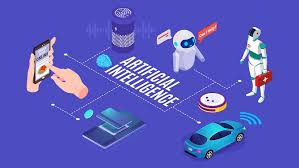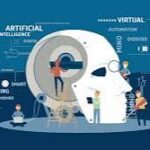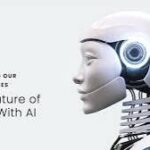How Artificial Intelligence Is Transforming Everyday Life

Artificial Intelligence (AI) has quickly transitioned from being a futuristic concept to a transformative force shaping how we live, work, and interact daily. From personal assistants in our phones to self-driving cars, AI technologies have seamlessly integrated into various aspects of modern life, offering convenience, efficiency, and innovation. Below, we explore how AI is revolutionizing different facets of everyday life and what it means for the future.
1. Enhancing Communication
AI has transformed how we communicate, breaking down barriers of language and accessibility. With tools like real-time language translation apps, voice-to-text systems, and chatbots, staying connected has never been easier.
- Language Translation: Platforms like Google Translate use AI to provide instant translations in multiple languages, enabling seamless global communication.
- Smart Assistants: AI-powered virtual assistants like Siri, Alexa, and Google Assistant process natural language to perform tasks, answer queries, and set reminders.
Impact: AI-powered communication tools are making global collaboration more accessible and inclusive, bridging cultural and linguistic divides.
2. Revolutionizing Healthcare
In healthcare, AI is driving breakthroughs in diagnosis, treatment, and patient care. Machine learning algorithms analyze medical data, helping professionals detect diseases earlier and personalize treatments.
- Diagnostics: AI systems like IBM Watson Health analyze medical images and patient records to identify conditions such as cancer and heart disease with remarkable accuracy.
- Virtual Health Assistants: Chatbots and apps provide round-the-clock medical advice, appointment scheduling, and medication reminders.
- Drug Discovery: AI accelerates the drug development process, identifying potential compounds faster than traditional methods.
Impact: AI is enhancing the accuracy of diagnoses, improving patient outcomes, and making healthcare more accessible and efficient.
3. Transforming Transportation
AI is at the core of innovations in transportation, from autonomous vehicles to smart traffic management systems. These advancements aim to improve safety, reduce congestion, and make travel more efficient.
- Self-Driving Cars: Companies like Tesla, Waymo, and others are using AI to power autonomous vehicles that navigate roads with minimal human intervention.
- Traffic Optimization: AI algorithms analyze traffic patterns in real-time, enabling better traffic flow and reducing travel times.
- Ride-Sharing Platforms: Apps like Uber and Lyft use AI to match drivers with passengers, optimize routes, and predict demand.
Impact: AI is making transportation safer, more efficient, and environmentally friendly by reducing fuel consumption and emissions.
4. Redefining Education
AI is revolutionizing education by personalizing learning experiences and making quality education more accessible to all.
- Personalized Learning: Adaptive learning platforms like Khan Academy and Duolingo tailor lessons to individual student needs and progress.
- AI Tutors: Virtual tutors provide instant feedback and support, helping students grasp difficult concepts.
- Accessibility: AI tools such as text-to-speech and speech-to-text software make education more inclusive for students with disabilities.
Impact: AI-driven education tools empower learners to study at their own pace and bridge gaps in traditional learning systems.
5. Reshaping Entertainment
AI has revolutionized how we consume and create entertainment, providing personalized content and enhancing creativity.
- Streaming Platforms: AI algorithms on platforms like Netflix and Spotify recommend shows, movies, and music based on user preferences.
- Gaming: AI enhances gaming experiences by creating realistic NPCs (non-playable characters) and adaptive gameplay.
- Content Creation: AI tools generate music, art, and even scripts, allowing creators to experiment with new ideas.
Impact: AI-driven entertainment ensures a highly personalized experience while pushing the boundaries of creative expression.
6. Improving Home Automation
Smart homes powered by AI are becoming increasingly common, offering convenience, security, and energy efficiency.
- Smart Devices: AI-enabled gadgets like smart thermostats, lighting systems, and appliances learn user habits to optimize energy usage.
- Home Security: AI-powered surveillance systems use facial recognition and motion detection to enhance home security.
- Voice Control: Smart speakers like Amazon Echo and Google Nest allow users to control devices through voice commands.
Impact: AI-powered smart homes improve quality of life by automating everyday tasks and reducing energy consumption.
7. Revolutionizing Shopping and Retail
AI has transformed the shopping experience by personalizing recommendations, streamlining logistics, and creating seamless transactions.
- Product Recommendations: E-commerce platforms like Amazon use AI to suggest products based on browsing history and preferences.
- Chatbots in Customer Service: AI chatbots provide instant assistance, resolving queries and improving customer satisfaction.
- Supply Chain Optimization: AI streamlines inventory management and delivery processes, ensuring products reach customers faster.
Impact: AI in retail enhances convenience, improves customer experiences, and optimizes business operations.
8. Streamlining Financial Services
AI is reshaping the financial industry by improving efficiency, detecting fraud, and enabling better financial decisions.
- Fraud Detection: AI systems analyze transaction patterns to identify and prevent fraudulent activities.
- Robo-Advisors: AI-powered financial advisors provide personalized investment advice and portfolio management.
- Customer Support: AI chatbots assist with banking inquiries, simplifying processes like account setup and loan applications.
Impact: AI enhances security, simplifies financial management, and makes banking services more accessible.
9. Transforming Workplaces
AI is automating repetitive tasks, enhancing productivity, and reshaping workplace dynamics.
- Automation: AI tools automate mundane tasks, freeing employees to focus on strategic work.
- Hiring Processes: AI analyzes resumes and screens candidates, speeding up recruitment.
- Collaboration Tools: Platforms like Slack and Microsoft Teams use AI to improve team collaboration and communication.
Impact: AI in workplaces boosts efficiency, improves decision-making, and creates new opportunities for innovation.
10. Supporting Mental Health and Well-being
AI is making mental health support more accessible through apps and tools that provide resources and therapy.
- Therapy Apps: Platforms like BetterHelp and Woebot use AI to offer virtual therapy and emotional support.
- Stress Management Tools: Meditation apps like Headspace and Calm leverage AI to guide users through mindfulness exercises.
Impact: AI-driven mental health tools break barriers to access and provide support in real-time.



